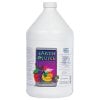Med68w
Well-Known Member
So I have very hard tap water with a Ph that fluctuates between 8.2- 7.5 and using FFOF soil. I’ve been using general hydroponics Ph down and read that it can kill the beneficial microbes in the soil. I’m using the age old organics line so I’m not too worried about the plants not getting what they need, I just hate finding out if I’m doing something that’s counterproductive since I do use teas and EWC. It’s an easy fix, just start using earth juice natural ph down or something similar. Question is how bad is phosphoric acid for the beneficials, or is it not a big deal and I’m worrying about nothing. Next run I’ll just prep the soil with some dolomite garden lime or some other buffer


